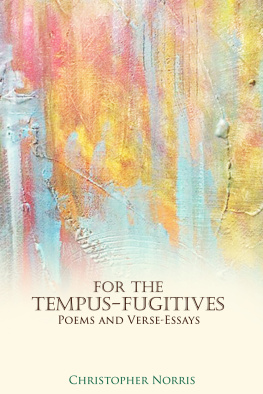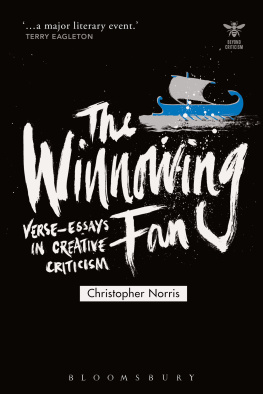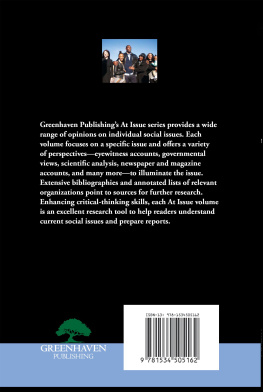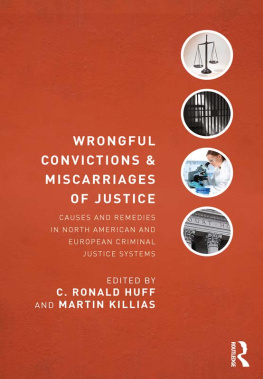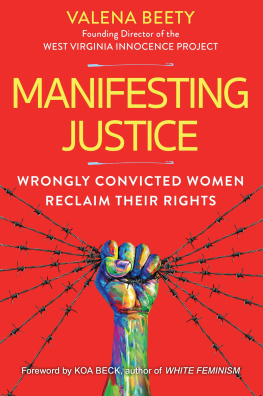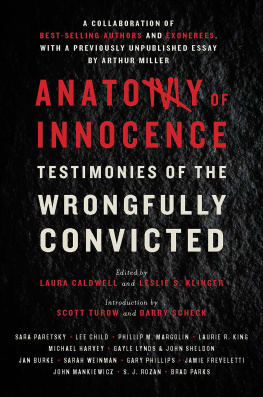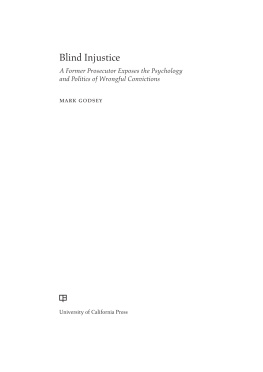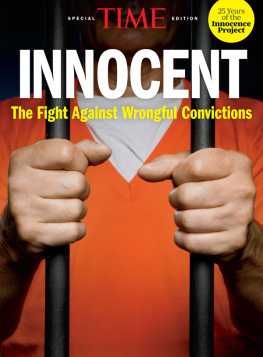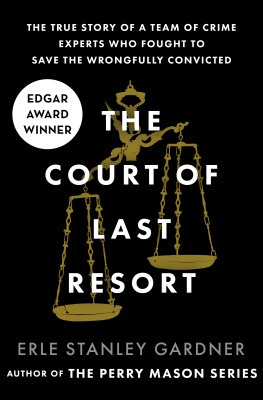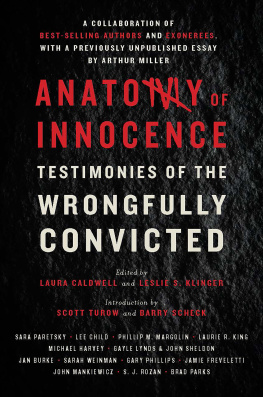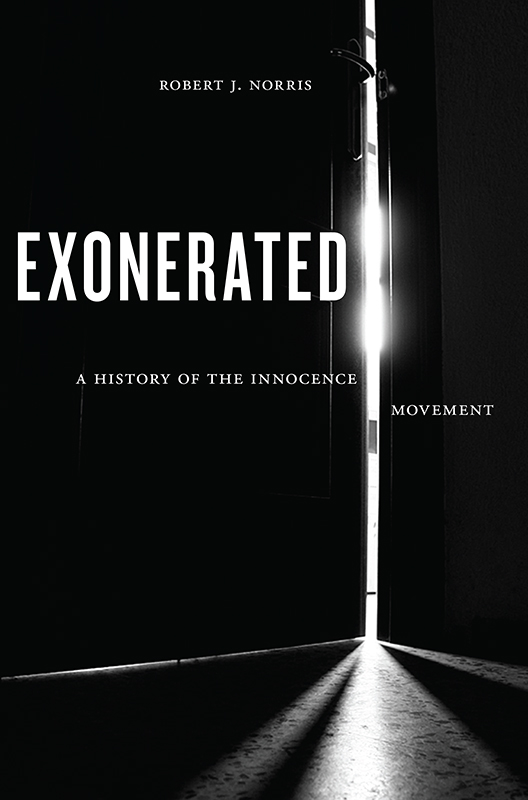
Exonerated
Exonerated
A History of the Innocence Movement
Robert J. Norris

NEW YORK UNIVERSITY PRESS
New York
NEW YORK UNIVERSITY PRESS
New York
www.nyupress.org
2017 by New York University
All rights reserved
References to Internet websites (URLs) were accurate at the time of writing. Neither the author nor New York University Press is responsible for URLs that may have expired or changed since the manuscript was prepared.
Library of Congress Cataloging-in-Publication Data
Names: Norris, Robert J., author.
Title: Exonerated : a history of the innocence movement / Robert J. Norris.
Description: New York : New York University Press, [2017] | Also available as an ebook. | Includes bibliographical references and index.
Identifiers: LCCN 2016045489| ISBN 9781479886272 (cl ; alk. paper)
Subjects: LCSH: Judicial errorUnited StatesHistory. | False imprisonmentLaw and legislationUnited StatesHistory. | Post-conviction remediesUnited StatesHistory. | Criminal justice, Administration ofUnited StatesHistory.
Classification: LCC KF9756 .N67 2017 | DDC 345.73/0122dc23
LC record available at https://lccn.loc.gov/2016045489
New York University Press books are printed on acid-free paper, and their binding materials are chosen for strength and durability. We strive to use environmentally responsible suppliers and materials to the greatest extent possible in publishing our books.
Manufactured in the United States of America
10 9 8 7 6 5 4 3 2 1
Also available as an ebook
In memory of Jane Raley and all that she stood for
Contents
First and foremost, I wish to thank Caitlyn ODonnell, my best friend, who continues to keep me grounded and make all that I do worthwhile. And I thank my family for making this possible through their unwavering support.
This research would not have happened without the kind and passionate people who opened up to me about their work and their lives. To all of those at Centurion Ministries, the Innocence Project, the Northwestern Center on Wrongful Convictions, and elsewhere who were willing to spend time with me and share their perspectives, I thank you and continue to admire the work you do.
This project benefited greatly from the insight of the many incredible scholars, teachers, and mentors with whom I have had the pleasure of working over the past few years. Whether through informal advice, random conversations, or feedback on the manuscript, this book is undoubtedly better due to their input. I am particularly thankful to James Acker, Alissa Worden, Allison Redlich, Frankie Bailey, and Richard Leo for their invaluable guidance and comments on earlier versions of this manuscript. I also wish to thank, in no particular order, Catherine and Vin Bonventre, Saundra Westervelt, Jon Gould, Marvin Zalman, Daniel Medwed, Christopher Dum, Jamie Fader, Kelly Socia, Andrew Davies, Giza Lopes, and Justin Pickett, all of whom, in various ways and whether they realize it or not, had an important impact on this work. I am also grateful to my research assistant, Carmen Lowe, who helped me get this manuscript across the finish line.
In the midst of this project, I moved to North Carolina to begin a new job at Appalachian State University. While the stress of moving and starting a new phase of my life seemed overwhelming at times, I was helped immensely by my wonderful new colleagues and friends. In addition to helping Caitlyn and me adjust to mountain life, they never failed to help me negotiate my professional transition and offer support for this research endeavor. In particular, I am indebted to my department chair, Phillip Ardoin, Cathy Marcum, Jeff Holcomb, Marian Williams, Derrick Lail, Will Hicks, Kevin Mullinix, Mark Bradbury, Adam Newmark, and Katy Dewhirst.
The development of this work from proposal to book has been possible thanks to Ilene Kalish, my editor at NYU Press, who was willing to take a chance on a first-time book author. She has been wonderful to work with, offering encouragement and constructive criticism throughout the process and helping make this book the best product it can be. I also owe great thanks to Caelyn Cobb, who has been immensely helpful in answering questions and keeping me on track, and Andrew Katz, who found and fixed my many errors and oddities.
Finally, I must acknowledge those about whom I write. It is one thing to read about wrongful convictions, but getting to know exonerees and their families, who withstand unimaginable suffering but manage to endure, as well as the advocates who work tirelessly on their behalf, has truly been inspiring. The struggles they face and the injustice they fight provide a daily reminder of why I do what I do.
Innocence and the Criminal Justice System
In September 1986, a drug deal in Springfield, Massachusetts, went awry. As many as six people were involved, but after shots were fired, an innocent bystander, 25-year-old Victoria Seymour, lay dead on the ground. Weeks later, in Connecticut, police arrested Mark Schand, a 21-year-old who had been identified in a photo lineup. He was charged with murder, robbery, and assault. At trial more than a year later, six witnesses claimed to know Mark was involved in the crime; seven others testified that Mark was in Hartford, Connecticut, on the night of the crime. Still, he was convicted and sentenced to life without parole.
Mark maintained his innocence while he sat in prison for nearly three decades, during which time his wife visited him weekly. In 2010, Centurion Ministries, a nonprofit organization, began investigating his case. Following a series of witness recantations and the discovery of additional evidence, Marks attorneys and Centurion filed a motion for a new trial, unopposed by the district attorney. On October 4, 2013, Mark walked out of prison, and on October 16, after 27 years, the charges were dropped. Mark was a free man.
Its Sad That Theres So Many of Us
I met Mark in January 2014 at an event with Centurion Ministries, a remarkable celebration for the 100th birthday of one of the organizations most generous donors, William Scheide. I was with a handful of Centurion workers and about 15 exonerees. Mark was the rookie of the group, or rook. Having only been freed months earlier, he was still adjusting to life on the outside. Looking around at the others in the room, he summarized his thoughts in one simple sentence: Its sad that theres so many of us.
The sentiment Mark expressed is not surprising among this group, who share a similar story. Having endured the hardships of a failed system, they share the belief that wrongful convictions happen all too often and that the criminal justice system is in need of serious reform. What is more surprising is how this notion has spread. The idea that there are, as Mark put it, so many wrongful convictionsenough to warrant attention and systemic changehas become a prominent one in criminal justice circles.
The belief that errors occur often enough to warrant system-wide reform is a fairly new development. Not long ago, the common belief was in the near-infallibility of the justice system. Throughout history, of course, there were those who were concerned about the conviction of innocent defendants,
That such miscarriages of justice can occur and should be avoided is fundamental to the United States system of criminal justice, but historically, to insist that they were more than rare aberrations would be met with skepticism. At the very least, wrongful convictions were far from the forefront of the collective criminal justice consciousness. Yet the past three decades have seen a remarkable shift in perception. The growing number of exonerationswhen, after being convicted, it is discovered that someone is actually innocent and is freedalong with the development of organizations dedicated to innocence advocacy and a reform agenda at all levels of criminal justice policy and practice suggest that a new era is upon us.
Next page



![Norris - Clybourne Park: [a play]](/uploads/posts/book/223649/thumbs/norris-clybourne-park-a-play.jpg)
